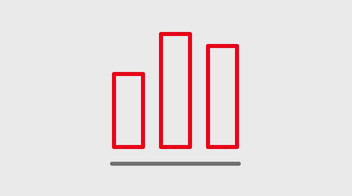Development in the year under review
- Punctuality is weaker, due in part to construction.
- Strikes and additional construction-related restrictions are a burden on performance development.
- Higher expenses, in particular for maintenance measures (mainly prefinanced for the Government) and cost increases drive the significantly weaker profit development.
DB Netze Track | 2023 | 2022 | Change | |
absolute | % | |||
Punctuality DB Group (rail) in Germany (%) | 90.1 | 90.9 | –0.8 | – |
Punctuality (rail) in Germany 1) ( %) | 88.9 | 89.7 | –0.8 | – |
Customer satisfaction (grade) | 3.6 | 3.3 | +0.3 | – |
Condition grade overall network (grade) | 3.0 | 3.0 | – | – |
Length of line operated as of Dec 31 (km) | 33,351 | 33,356 | –5 | – |
Train kilometers on track infrastructure (million train-path km) | 1,116 | 1,132 | –16 | –1.4 |
thereof non-Group railways | 437.7 | 419.8 | +17.9 | +4.3 |
Share of non-Group railways ( %) | 39.2 | 37.1 | +2.1 | – |
Total revenues (€ million) | 6,340 | 6,266 | +74 | +1.2 |
External revenues (€ million) | 2,157 | 2,035 | +122 | +6.0 |
Share of total revenues (%) | 34.0 | 32.5 | +1.5 | – |
EBITDA adjusted (€ million) | –435 | 1,244 | –1,679 | – |
EBIT adjusted (€ million) | –1,098 | 601 | –1,699 | – |
Operating income after interest (€ million) | –1,244 | 505 | –1,749 | – |
Gross capital expenditures (€ million) | 10,746 | 8,969 | +1,777 | +19.8 |
Net capital expenditures (€ million) | 2,830 | 1,738 | +1,092 | +62.8 |
Employees as of Dec 31 (FTE) | 56,084 | 52,510 | +3,574 | +6.8 |
Employees annual average (FTE) | 54,551 | 52,128 | +2,423 | +4.6 |
Employee satisfaction (SI) | – | 3.9 | – | – |
Share of women as of Dec 31 (%) | 21.4 | 20.7 | +0.7 | – |
Total noise-remediated lines as of Dec 31 (km) | 2,255 | 2,202 | +53 | +2.4 |
1) Non-Group and DB Group train operating companies.
The punctuality of DB Group and of rail in Germany declined slightly. One of the main reasons for this is the high level of infrastructure disruptions due to old and fault-prone facilities. This also includes a year-round high level of restricted speed sections due to certain infrastructure disruptions (including damaged concrete ties issue). Further major drivers of delays were a high overall volume of construction in connection with a large number of very short-term construction measures and the continued high capacity utilization of the track infrastructure, particularly in the highly utilized bottleneck network.
Customer satisfaction at DB Netze Track fell in 2023. The 230 customers who participated in the survey were particularly critical of construction measures and infrastructure availability.
Train kilometers on track infrastructure declined slightly. Negative effects from strikes and more intense construction-related restrictions, as well as a lack of economic stimuli, were only partially offset by a progressive recovery in passenger transport. Demand from non-Group customers increased, mainly as a result of the takeover of transport services in regional transport. A decline was recorded among intra-Group customers, driven by DB Regional and DB Cargo.
The economic development was tense, mainly due to additional burdens and maintenance services (especially prefinancing of infrastructure measures) in connection with measures to improve quality and availability as well as the non-recurring special items from the previous year. The adjusted net profit and loss figures deteriorated very sharply and were significantly negative:
- Revenues (+1.2%/ € +74 million): Slight increase, positive price effects were dampened by the effects of strikes and construction restrictions.
- Other operating income (–21.5%/€ –295 million): Significant decline, partly due to the omission of income from real estate sales in the previous year and lower grants, primarily for the repair of flood damage as a result of the Ahrtal flood in 2021 as well as lower income from the release of provisions.
On the expense side, there were significant additional burdens, in particular for measures to expand capacity and improve quality, as well as from cost increases:
- Cost of materials (+29.4%/€ +791 million): The significant increase is largely due to significantly higher maintenance measures (in particular in connection with the prefinancing of quality and capacity measures, the replacement of concrete ties and inflation). In addition, energy expenses (mainly due to price effects; partial compensatory effects from the electricity price brake are shown in the extraordinary result) and maintenance of vegetation and winter services.
- Other operating expenses (+34.9%/€ +522 million): The significant increase was partly due to the Group charges introduced in 2023 and higher expenses for IT services and compensation for damage.
- Personnel expenses (+10.9%/€ +402 million): Significant increase, as a result of collective bargaining agreements and the higher number of employees.
- Depreciation (+3.1%/€ +20 million): Also increased slightly due to capital expenditures.
Capital expenditures increased significantly, mainly as a result of higher capital expenditures for the existing network. Net capital expenditures increased even more significantly as a result of the prefinancing of measures to improve the quality and availability of track infrastructure for the Federal Government.
The number of employees increased significantly to cover demand and ensure succession planning, particularly in the areas of maintenance, construction projects and operations.
The share of women was significantly higher.
The total number of noise-remediated track kilometers increased due to the continued implementation of measures.


